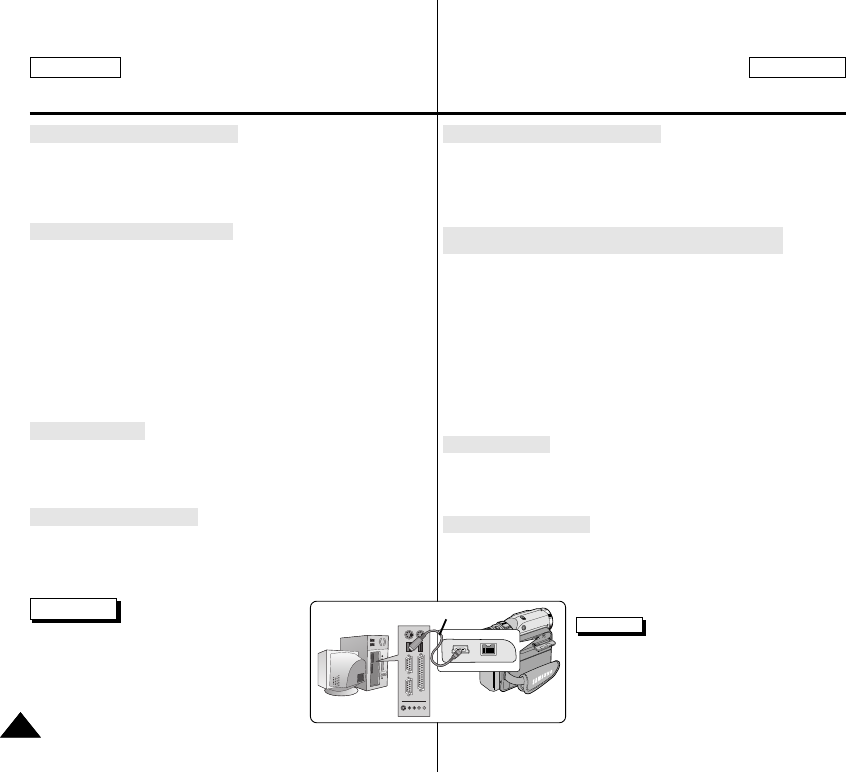
Interface USB
USB interface
Using the “Removable Disk” function
✤ You can easily transfer data from a Memory Card to a PC without
additional add-on cards via a USB connection.
1.
Set the mode switch to
Memory Card
, set the power switch to CAMERA or
PLAYER.
2. Connect one end of the USB cable to the USB jack on the camcorder and
the other end to the USB port on your computer.
Using the “USB streaming” function
✤ USB streaming data type is MPEG4.
✤ To use USB STREAMING, the DVC Media 5.1, DirectX 9.0a and
Windows Media Player 9.0(included in the CD) programs must be
installed in the PC.
✤ You can view CAMCORDER video from the PC using USB
STREAMING.
You can also store it as a moving picture in the "asf" file format, or as a
still image in the "jpg" file format on a PC.
1. Set the mode switch to TAPE, set the power switch to CAMERA or PLAYER.
2. Connect one end of the USB cable to the USB jack on the camcorder and
the other end to the USB port on your computer.
3. Execute the DVC Media 5.1 program.
If you want the detailed description of USB streaming, refer to the
DVC Media 5.1 User's Manual.
Connecting to a PC
1. Connect a USB cable to the USB port on the PC.
2. Connect the other end of the USB cable into the proper terminal on the
camcorder. (USB jack)
-
If a PC is connected to the camcorder with a USB cable, only the Power
Switch, Zoom Switch, Mode Switch and NITE PIX operate.
Disconnecting the USB cable
✤ After completing the data transmission, you must disconnect the cable in
the following way:
1.
Select the removable disc icon and click the right mouse button to select [Eject].
2. Select [Confirm] and disconnect the USB cable when the Windows Splash
screen appears.
Notes
■
If you disconnect the USB cable from the PC or the
camcorder while transferring, the data transmission
will stop and the data may be damaged.
■
If you connect the USB cable to a PC via a USB
HUB or simultaneously connect the USB cable
along with other USB devices, the camcorder may
not work properly.
- If this occurs, remove all USB devices from the
PC and reconnect the camcorder.
Utilisation de la fonction «Disque amovible»
✤
Le port USB vous permet de transférer facilement les données d’une carte
Memory Card vers un ordinateur, sans cartes supplémentaires.
1. Placez le sélecteur de mode sur mémoire, réglez le commutateur sur CAMERA
(caméscope) ou PLAYER (magnétoscope).
2. Connectez l’une des extrémités du câble USB au port USB du caméscope et
l’autre au port de votre ordinateur.
Utilisation de la fonction de diffusion en temps réel via le port USB
(USB STREAMING)
✤ Le type de données de diffusion en temps réel via le port USB est MPEG4.
✤ Pour que la fonction USB STREAMING puisse être utilisée, les programmes
DVC Media 5.1, DirectX 9.0a et Windows Media Player 9.0 (inclus dans le
CD) doivent être installés sur PC.
✤ Vous pouvez afficher l'image mobile du CAMÉSCOPE depuis le PC à l'aide
de la fonction USB STREAMING.
Vous pouvez également l'enregistrer sous forme d'image mobile au format
.asf ou sous forme d'image fixe au format .jpg sur le PC.
1.
Placez le sélecteur de mode sur TAPE et réglez le commutateur sur CAMERA ou
PLAYER.
2. Connectez l’une des extrémités du câble USB au port USB du caméscope et
l’autre au connecteur USB de votre ordinateur.
3. Exécutez le programme DVC Media 5.1.
Pour une description détaillée de la fonction USB STREAMING, consultez le guide
de l'utilisateur de DVC Media 5.1
Connexion à un PC
1. Branchez le câble USB sur le port USB situé à l’arrière de votre PC.
2.
Branchez le câble USB dans la prise du caméscope prévue à cet effet (prise USB).
- Lorsque le caméscope est connecté à l’ordinateur via un câble USB, toutes
les touches sont inactives, à l’exception du commutateur, du sélecteur de
mode, du zoom et du sélecteur de capture de nuit.
Déconnexion du câble USB
✤ Une fois la transmission de données achevée, vous devez déconnecter le
câble en procédant comme suit :
1. Sélectionnez l'icône représentant un disque amovible et cliquez sur le bouton droit
de la souris pour sélectionner [Eject].
2. Sélectionnez [Confirm] et déconnectez le câble USB lorsquel 'écran Windows
Splash s'affiche.
Important
■
Veillez à ne pas débrancher le câble pendant le
transfert des données. L’interruption du transfert
pourrait endommager les données.
■
L’utilisation d’un concentrateur USB ou la connexion
simultanée de plusieurs périphériques USB peuvent
entraîner un dysfonctionnement du caméscope.
- Si cela se produit, débranchez tous les
périphériques USB du PC, puis rebranchez le
caméscope.
USB
DV
USB Cable
ENGLISH
FRANÇAIS
8080
00752D SCD303 USA+FRA(60~106) 4/13/04 9:50 AM Page 80


















